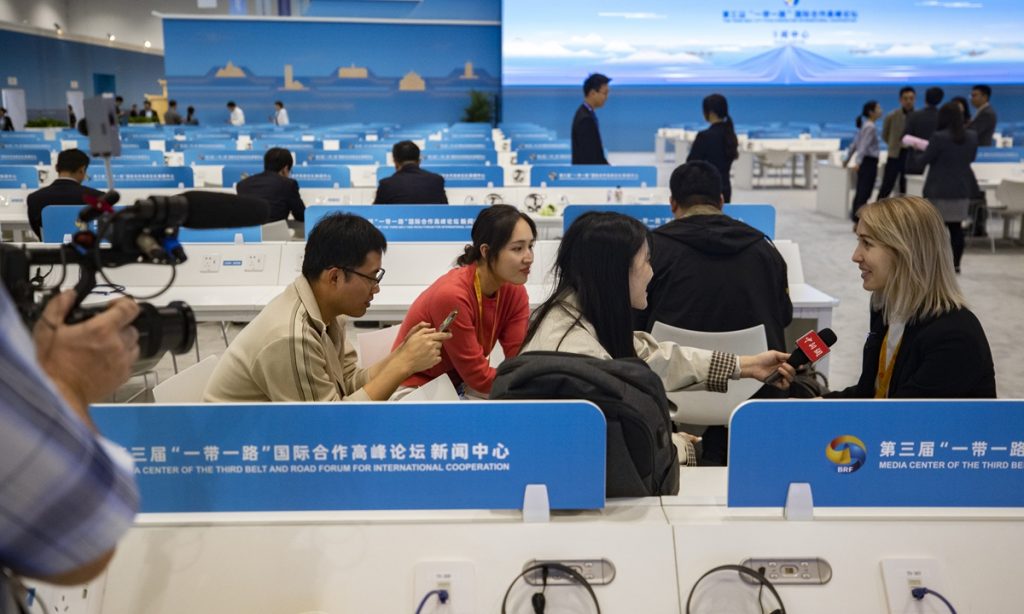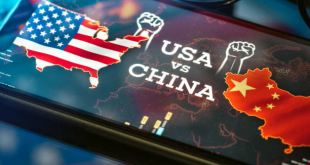Published :October 17,2023
By Yang Sheng and Zhang

A foreigner is being interviewed by Chinese journalists in the media center for the third Belt and Road Forum for International Cooperation (BRF). The center started a trial run at the China National Convention Center on October 15, 2023.Photo:VCG
Amid turbulence as conflicts and bloodshed continue around the globe in countries like Palestine, Israel, Ukraine and Russia, members of the international community have never stopped seeking hope and solutions to make development sustainable, and maintain or restore peace and stability, with leaders and representatives from more than 140 countries as well as 30 international organizations arriving in China to participate in the upcoming Belt and Road Forum (BRF) for International Cooperation to be held in Beijing from Tuesday to Wednesday.
Chinese President Xi Jinping will attend the opening ceremony of the forum where he will deliver a keynote speech, and later hold a welcome banquet and bilateral events for guests attending the forum, according to the Chinese Foreign Ministry. The BRF this year will be held under the theme “High-quality Belt and Road Cooperation: Together for Common Development and Prosperity.”
Kenyan President William Ruto on Sunday arrived in Beijing to attend the BRF, and Chilean President Gabriel Boric, who will also attend the forum, arrived in Chengdu, capital of Southwest China’s Sichuan Province, to start his trip in China, the Xinhua News Agency and CGTN reported.
China Central Television aired an interview with Russian President Vladimir Putin on Sunday, with TASS reporting that this is an interview ahead of Putin’s visit to Beijing. TASS said on Sunday that the Russian leader will visit China to attend the BRF as well as a China-Russia summit.
Great significance
“In 2008-2011, the world had just experienced the global financial crisis, and the developed economies had stagnated,” Huang Renwei, executive director-general of the Fudan Institute for Belt and Road and Global Governance, told the Global Times on Sunday. “The flow of funds in the global economy as well as the mainstream of globalization had changed, so China had to search for new markets to change its old system that was heavily reliant on developed Western markets. This was the background against which China proposed the BRI in the first place,” Huang said.
Through the BRI, China used its investments, technologies and infrastructure projects to link more and more developing countries which had been marginalized in the West-dominated globalization, Huang noted. “The initiative [BRI] is not just about building bridges and roads, but inevitably a phenomenon based on the changing of the world and China’s economic structure.”
Huang said that “the BRI is a historically significant, innovative and far-sighted move proposed by China. If the BRI hadn’t been proposed 10 years ago, the recession in the global economy and market would have been severer, the economic damage caused by the COVID-19 pandemic would have been heavier, and the US launched trade war against and ‘decoupling’ from China will be more destructive.”
To bring hope
Chinese analysts said the BRF will provide a thorough summary of the achievements and lessons of the past decade, and will discuss and conclude with a consensus and a significant plan about how to keep pushing the construction of the Belt and Road in the future. It seeks to improve and reform globalization and global governance, especially when world peace and development are facing serious challenges and global post-pandemic recovery is fragile.
The third BRF is the most important diplomatic event hosted by China this year, and the most significant celebration for the 10th anniversary of the proposal of BRI, said Chinese Executive Vice Foreign Minister Ma Zhaoxu on Friday.
Shen Yi, a professor of international relations at Fudan University, told the Global Times on Sunday that he hopes the upcoming BRF will be an event that “continues with the past and opens up the future.”
“The world is in persistent unrest, as the ongoing Ukraine crisis and the latest Palestine-Israel conflict are bringing more uncertainties and bloodshed. After the COVID-19 pandemic, global economic growth lacks new impetus,” he said.
The disadvantages and problems of the old US-dominated unipolar world order and West-dominated globalization have been exposed, and the world is asking for new solutions and more contributions from China, experts said.
“The BRF is expected to produce substantial outcomes, both in the form of cooperation documents, initiatives and mechanisms, and in terms of projects, funds and measures. The total number of deliverables is likely to exceed those of the previous two forums,” Ma said.
“In this world of change and volatility, the BRF will showcase how the BRI, a Chinese initiative with international support, has delivered benefits to all, and present the new progress China has made in advancing major-country diplomacy on all fronts since the 20th National Congress of the Communist Party of China. It will send a message of solidarity and win-win cooperation of countries around the globe, and add positive energy and stability to the world,” Ma told the media.
Li Haidong, a professor at the China Foreign Affairs University, told the Global Times on Sunday that the joint construction of the Belt and Road is a key part of China’s idea of building a global community of shared future, and in the future, China will keep invest and promote the BRI to make it a better public good for the world, so that more countries are able to benefit from it.
‘Don’t be jealous’
Some Western media and politicians have always tried to badmouth and stigmatize the BRI, and very recently they said the forum has not seen participation by Western developed countries. Chinese experts said the arrogance of the West makes them fail to understand the BRI and fail to provide any meaningful alternative to compete with the BRI.
The China-proposed initiative has changed the world significantly, and compared to 10 years ago, more countries have participated in this initiative, so the BRI is successful and will keep being successful with or without the participations or the compliments from the US and its allies, analysts noted.
Huang said the US-led West’s attitude toward the BRI was different according to the phase of the initiative: In the first two to three years after the BRI was proposed, the West downplayed and looked down on it as they did not believe China could afford to or effectively promote such a huge plan with so many uncertainties and risks. From 2018 to 2019, the West realized the influence and achievements of the BRI, so they started to badmouth and stigmatize the BRI, with the rumors like it being a “debt trap” and a manifestation of “China’s neocolonialism.”
“Since 2021, in order to compete with the unstoppable BRI, the US, the EU, Japan and India proposed global infrastructure initiatives as well. It’s just like plagiarism. These attempts are mainly lip-services. They lack funds and they don’t have enough investments. In some cases they have political conditions for their partners, or their infrastructure projects get delayed again and again,” Huang noted.
Build Back Better World (B3W) is an initiative undertaken by the G7. Launched on June 12, 2021, it would provide “an alternative” to the China-proposed BRI for infrastructure development of “low- and middle-income countries,” Reuters reported in 2021.
However, the B3W has not been mentioned by international mainstream media in the past two years. In 2022, the US and its allies created a new term “the Partnership for Global Infrastructure and Investment (PGII)” and US President Joe Biden unveiled “a proposed corridor linking India, the Middle East and Europe” at the G20 summit in New Delhi in September – and pledged there would be more corridors to come.
Due to the outbreak of war in Palestine, and the different stances among the West, India and the Islamic countries on the Palestine-Israel conflict, analysts said prospects for Biden’s ambitious initiative is not optimistic at all.
China and the world welcome more participants to make joint efforts to boost global recovery and improve globalization, but those strategies which are exclusive and prioritize major power competition will never serve the demands of the world and will fail to win support from the majority of the international community, experts noted.
 Africa -China Review Africa -China Cooperation and Transformation
Africa -China Review Africa -China Cooperation and Transformation
